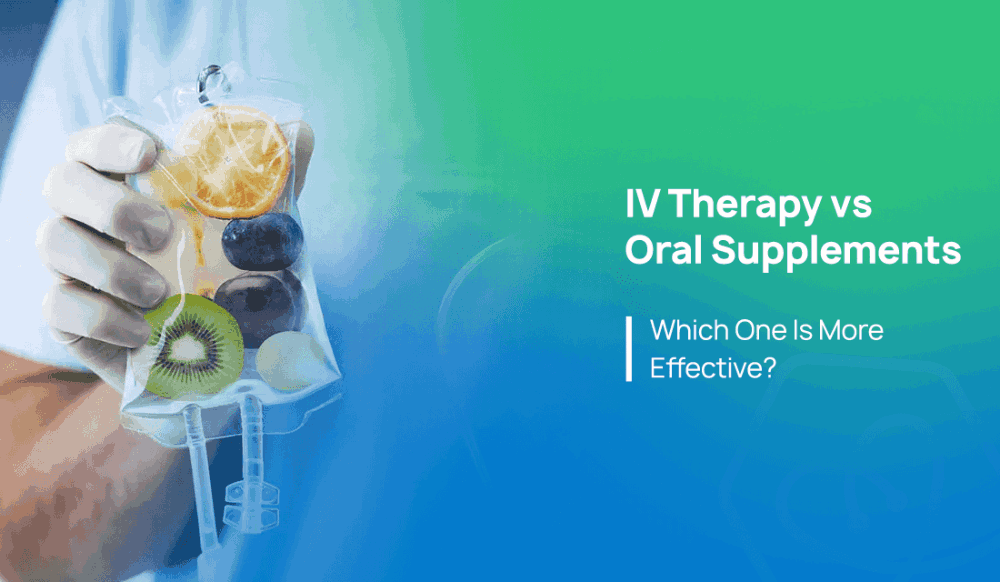
The majority of us are aware of the vital functions that various vitamins, minerals, and other nutrients play in our bodies. For our bodies to operate at their best, we need to provide them with the necessary nutrients. There are some situations where we must give our bodies additional amounts of these vital nutrients to guarantee that everything is back to normal while making sure they are being absorbed by our system
In addition to the traditional method of ingesting nutrients through the oral route, the additional way to deliver supplements is through IV therapy. Intravenous (IV) treatment is a novel, and very successful, method of getting nutrients directly into the bloodstream. Which is better, though? Let’s investigate.
Although the notion of IV therapy was originally discussed in medical writings from the Middle Ages, its true efficacy was not realised until Dr Thomas Latta used IV therapy to treat cholera symptoms in the 1930s. And IV treatment is still crucial to this day
Intravenous therapy, often known as IV therapy, involves injecting or infusing liquid medications directly into a vein. During operations and even during labour and delivery, IVs are employed. One may even receive fluids, medicines, and nutrition with IV treatment in the comfort of their home.
Oral supplements are simply swallowed; they can be taken orally in the form of liquids, pills, or even capsules. Oral supplements are prescribed to individuals with various ailments and are one of the most preferred methods of treatment.
The absorption of IV and oral vitamins differs significantly. When it comes to continuing maintenance and therapy, oral vitamins do offer real advantages. They work well in maintaining the high amounts of nutrients obtained during IV therapy.
However, those nutrients must follow a difficult and long route where much of their potency is lost. It’s also a path where a lot of mishaps may happen.
Only a small percentage of the nutrients we consume can, at most, reach the cells that control our metabolism.
Patients with bloating, leaky gut, small intestine bacterial overgrowth, or food allergies often lose a lot of nutrients during these processes.
The process of receiving vitamins and minerals intravenously is quite different. Bypassing the digestive system, the IV delivers 100% of each vitamin into your circulation.
Vitamins are delivered in considerably larger concentrations than ever possible by oral ingestion. One starts to experience the benefits of improved hydration right away after receiving their treatment, and the effects of the vitamins start to take effect sooner.
An IV treatment gives your well-being a noticeable boost, whether it’s a daily component of your health routine or a one-time boost when you’re sick and in need of it.
ALSO READ: Tube Feeding for People with Severe Dementia
The aim of both IV treatment and oral supplements is to provide our bodies with the proper nutrients without sacrificing effectiveness. However, contrary to what one may anticipate, both strategies are very different from one another.
IV fluids like IV vitamins by definition, are liquids. On the other hand, oral solutions might come in the form of liquids, pills, capsules, tablets, powders, or tinctures.
IV fluids are given to you through a drip line that is put into your arm, unlike supplements that you take orally. As a result, the fluids might enter the bloodstream right away.
Compared to oral supplements, IV treatment has several benefits. They include
When you receive IV treatment, you receive a range of vitamins, minerals, and other nutrients in one drip bag. Think about how many pills, capsules, powders, or liquids you’d have to take to get the same results as an oral supplement.
With the option to tailor your IV ingredient combination, you have control over your health. Want more magnesium to relieve aches and pains or more vitamin B12 for more energy? Add it to your IV drip after professional advice. Since oral supplements come in set doses, you don’t have as much control over what you take.
By rehydrating the body when it is dehydrated with electrolyte-rich fluids, IV fluids refresh the body. Depending on your specific health situation, several IV fluids can assist in regulating fluid levels in the cells so they can operate optimally. Your entire well-being will noticeably improve after your body receives IV therapy’s nutrient-rich hydration.
When administered at standard levels for FDA-approved purposes, vitamin drips are safe.
Supplements you take orally must pass through your digestive system since they are ingested via the mouth. Oral supplements can be taken as liquids, pills, capsules, or chewable tablets, among other forms. The cons of oral supplements include
Typically, individuals choose a more practical approach, such as taking oral vitamins. But compared to nutritional supplements taken orally, the effects of IV treatment are quicker and more potent.
Many patients who had these IV treatments for themselves reported having better skin, a stronger immune system, and more vitality.
It has also been shown to be very helpful for people with sensitive digestive systems who can’t take a lot of supplements orally.
IV therapy is particularly beneficial for those with chronic illnesses who cannot obtain the nourishment they need through food or oral supplements.
Dehydration is linked to a variety of illnesses and medical disorders, including migraines. In addition to giving the body vitamins and minerals, IV supplements also give the body the fluid it needs to be balanced (also called homeostasis). Your general health also depends on having a well-hydrated body, which IV treatment helps you achieve.
Our doctors and registered nurses are specialists in IV therapy. They can assist you in choosing the ideal vitamins and minerals for your particular needs and guide you through the advantages of IV treatment over oral supplements in great detail. Make an appointment to find out more about us and the benefits of IV therapy.
Compared to, for instance, drinking water, eating well, or taking medication orally, IV may help replenish, rejuvenate, and cleanse your body more quickly.
Your IV treatment sessions should typically take place once every two weeks or one to two times each week. Follow the schedule your doctor specifies if you’re receiving IV treatment for a particular illness.
The discomfort and pain while on IV drips is minimal and might have a fleeting sensation.
IV vitamin drips are worthy and effective as it enters the bloodstream right away performing their action.

